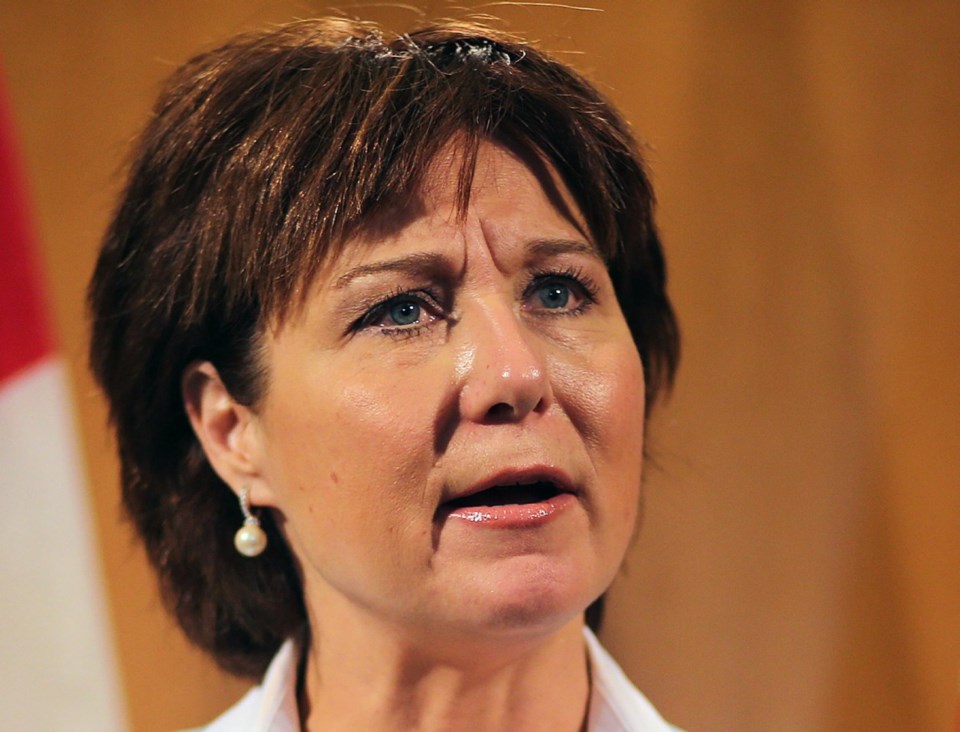 Christy Clark worked briefly as a nanny in Paris in her youth, but she’s back this week as the premier of a province that she said is “kind of a star of the Canadian climate-change fight.”
Christy Clark worked briefly as a nanny in Paris in her youth, but she’s back this week as the premier of a province that she said is “kind of a star of the Canadian climate-change fight.”
She said she’s there to support Prime Minister Justin Trudeau at the climate-change summit, “to have him tell our story of what we’ve done.”
The holy grail everyone is looking for is a way to reduce carbon emissions in as pain-free a way as possible, without entailing economic slowdown or job losses, while balancing developed nations with the developing world.
With an eight-year track record, one of the B.C. carbon tax’s outstanding features is that it imposes a cost on most greenhouse-gas emissions, but there has been no corresponding drop in economic growth.
She said it covers most of the economy and it’s relatively high but “our economy is still growing. It’s just a fantastic story.”
Clark is pitching in as a demonstration that “you can grow the economy at the same time you take really decisive environmental action. B.C. is the best example of that anywhere in the world.”
It’s an encouraging story to tell on the world stage. But at home, the finer points are still being debated after last week’s release of the climate leadership team’s report. Those points include:
• The fact that she has frozen further increases in the tax until 2018, so much of the momentum to continue curbing emissions has been lost and they are creeping up again.
• The conclusion that the legislated target of a 33 per cent reduction in emissions from 2007 levels by 2020 is going to be missed, mostly because of the time-out described above.
• The questions about her wholesale commitment to building a liquefied natural gas industry in B.C., which critics say would almost certainly negate any further cuts in emissions.
Clark defended the carbon-tax freeze, saying it was a question of balance.
“It’s never been our goal to try and be way ahead of rest of country all the time. We want to be leaders, but we want everybody else to catch up. There’s a tipping point where B.C. is so far ahead we become completely uncompetitive.
“We’d have an effective environmental policy with no industry to regulate anymore because they’ll all have moved to places where they can pollute freely. That’s the balance we’ve got to find.”
The carbon tax will stay at its current rate until 2018 because that’s what she promised during the 2013 election.
“I’m not going to break that promise. We don’t want to foist something on people when they’re not ready. We need to have a thorough discussion about what we do next.”
She said the team’s conclusion that the 2020 target won’t be met is being scrutinized by government, which is taking it apart and trying to understand it.
“For us, the opportunity to stop 1,000 coal plants (by supplying LNG to Asia) is really significant. We should be talking about how B.C. can get credit for carbon emissions we’ve reduced outside our borders.”
It would be the biggest contribution Canada could make. Getting some formal credit in the emission calculations “is one of things lots of people are talking about in Paris right now.”
B.C. contributes 0.2 per cent of global emissions and “there is only so much gain we can make within our borders. Not to say we shouldn’t continue to try to reduce, absolutely we should.
“We’ve got to get to that low-carbon economy everybody is talking about, and a transitional fuel [natural gas] is absolutely essential to making that happen.”
Clark does not expect the new federal government to emulate B.C. with a national carbon tax. “They want to avoid fiddling around in a prescriptive way. They know these environmental decisions are inextricably linked to job creation or job diminishment.”
She said Ottawa could provide more tools in the form of green tax incentives.
Just So You Know: Clark and other premiers paid their respects at the concert hall that was one site of the terrorist rampage two weeks ago. She said she was familiar with the neighbourhood from her days as a student.
Most people there Sunday were struck with the thought of “how easily it could have been me, or my family.”



